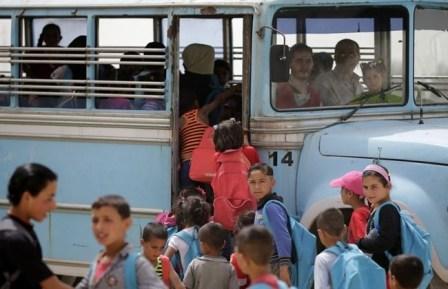
Half of the kids in Lebanon say they’ve been bullied, but just a quarter of parents know about it, according to a new report from Save the Children.
Only 39 percent of children have even heard of the term “bullying,” the report adds, compared with just 47 percent of adults.
The problem is the culture surrounding bullying in Lebanese schools, says Fadi Yarak, director general for education at the Education Ministry. And a new series of government initiatives supported by the United Nations children’s fund and Save the Children intends to change it.
Bullying “is a hidden issue in Lebanon,” Allison Zelkowitz, Save the Children’s Lebanon country director, says. Many adults believe that it’s “a normal part of childhood,” and claim that victimized children should “toughen up.” The effect of this attitude is to discourage children from speaking up to the elders who could help them.
In many cases, children are ashamed by what is happening to them, Zelkowitz says, “especially because some of it is very harsh [being] beaten up, ostracized.” When those confessions could be shrugged off completely, children are even less likely to report.
Parents in particular need to ask their children probing questions to find out how others are treating them, she says.
Save the Children’s report found that bullying in Lebanese schools is most often physical but Zelkowitz says the issue is complicated. Many children also suffer verbal abuse, she says, but don’t recognize it as a form of bullying worthy to report.
The manner of abuse also differs across social groups. Palestinians experience more physical bullying than others, while Syrians experience more verbal abuse. Syrians are often made fun of because they are Syrian, or because they tend to be poorer than their peers and have to work in their free time, Zelkowitz says.
The short- and long-term emotional impact of bullying can hamper a child’s education. According to the report, 12 percent of bullying victims drop out of school, and 29 percent of caregivers said they had noticed a drop in their child’s grades as a result of bullying.
The Education Ministry’s Child Protection Policy, which was enacted last month, lays out a set of guidelines for schools to follow in order to create a nonviolent learning environment and ensure their students’ psychological and physical health. The guidelines aim to clarify how to both react to bullying and prevent it in the first place, Yarak says.
The implementation of the guidelines has involved government training for teachers and awareness sessions for students and parents.
The ministry has also established a hotline for victims and has sent counselors into schools to help integrate the guidelines, he adds.
UNICEF has assisted in the rollout by helping train the counselors, establishing child protection units and working with the Center for Educational Research to develop training modules for teachers and principals, Nisrine Tawily, child protection specialist at UNICEF Lebanon, says. Save the Children, Zelkowitz says, is also contributing to the training. Their efforts aim to ensure quick action against bullying, while providing emotional support for all parties, including the bullies, who in many cases suffer themselves, whether at home or at school. Addressing bullying properly means offering them the counseling they need, Zelkowitz says.
Also vital is the classroom environment created by teachers, Ahmed Bayram, Save the Children Lebanon’s communications coordinator, says. “There are so many success stories out there ... simple activities that encourage friendship and togetherness” through games or interaction with nature.
And through that positivity, teachers can “send a message that we’re all equal, whether we have a paralyzed hand” or are otherwise different, he says.
Lebanon should aim for a ban on bullying, he notes. “But before that you need to work with the public ... to create a conversation where if a child gets hit or gets name-called, [he must] be listened to.”
Source: The Daily Star
 FR
FR EN
EN AR
AR








